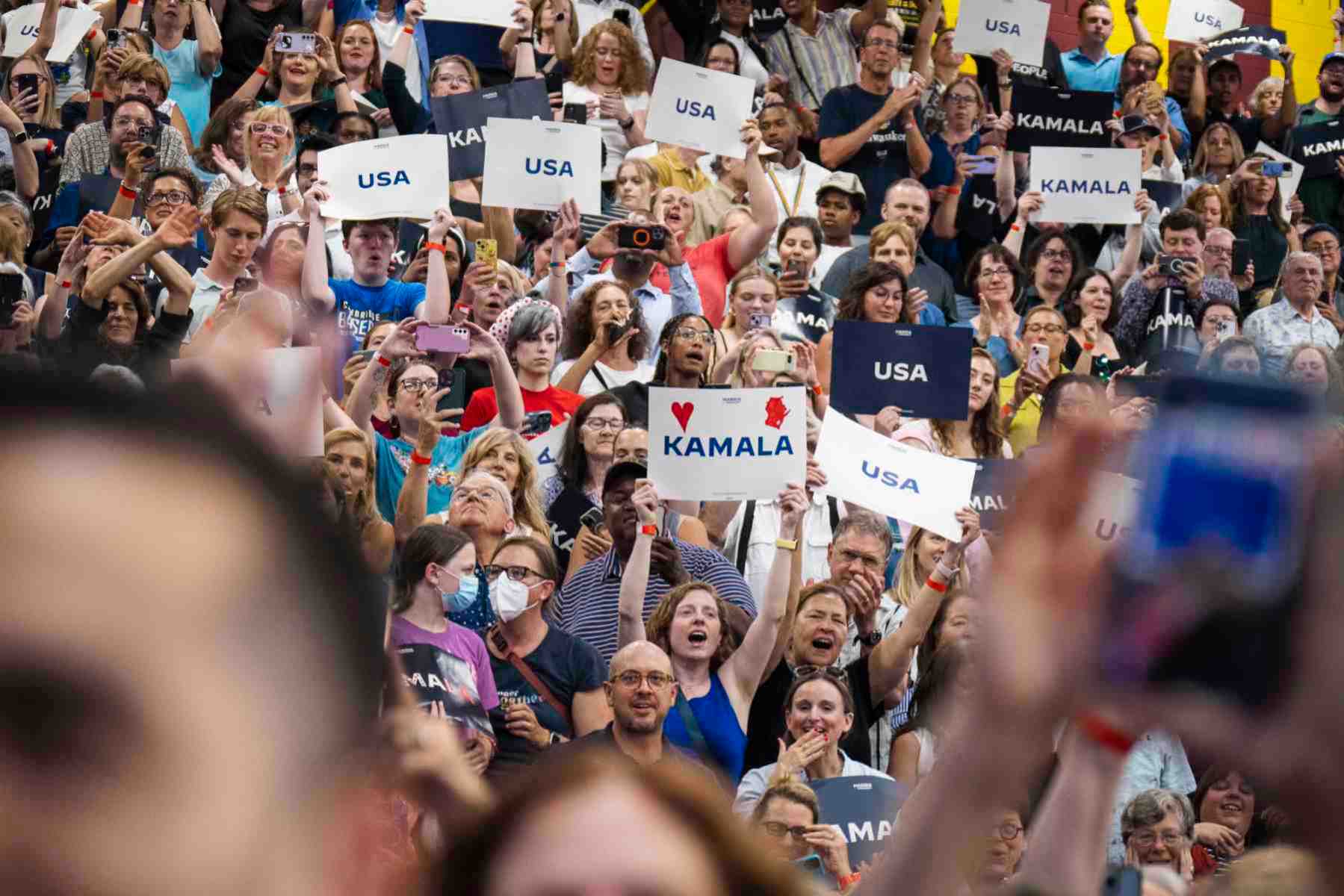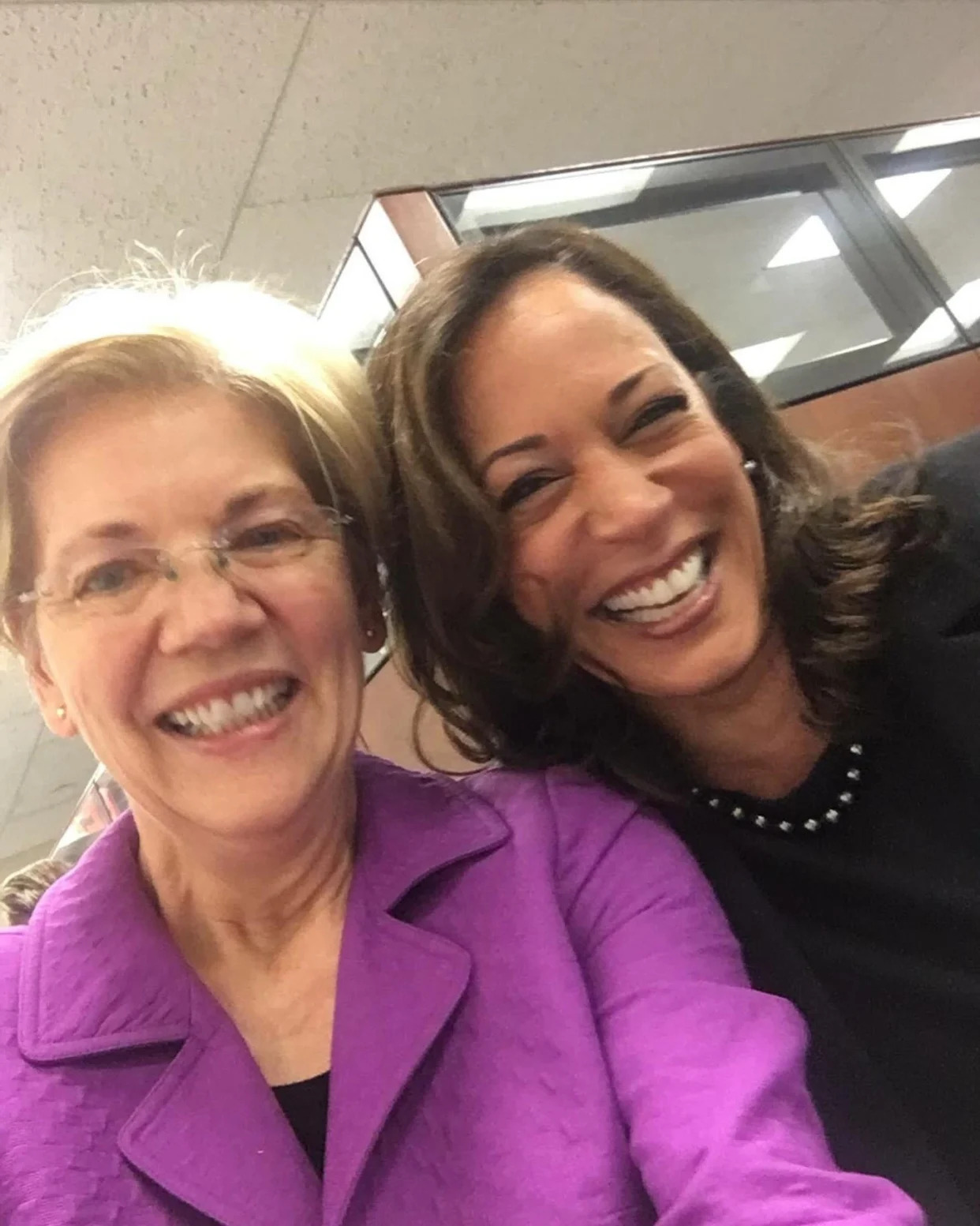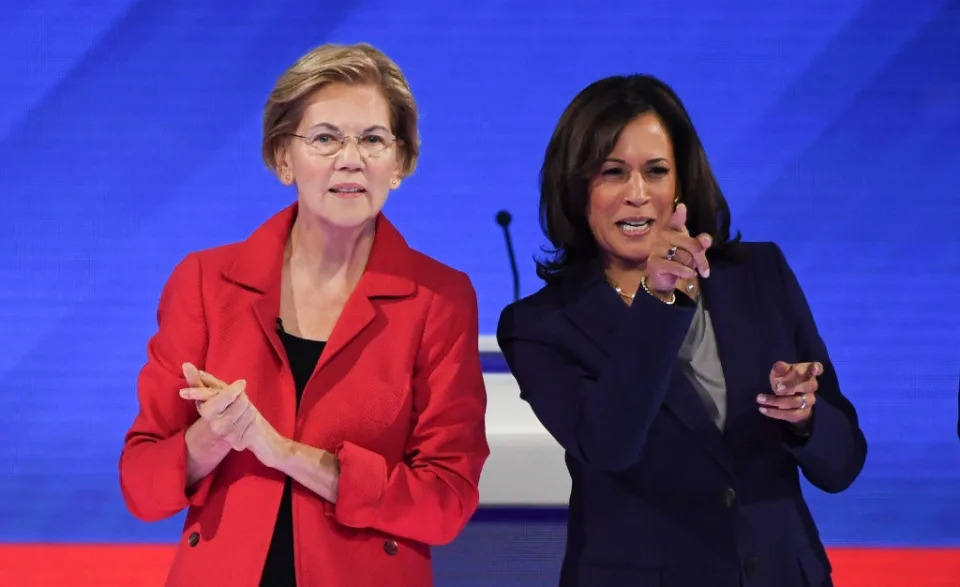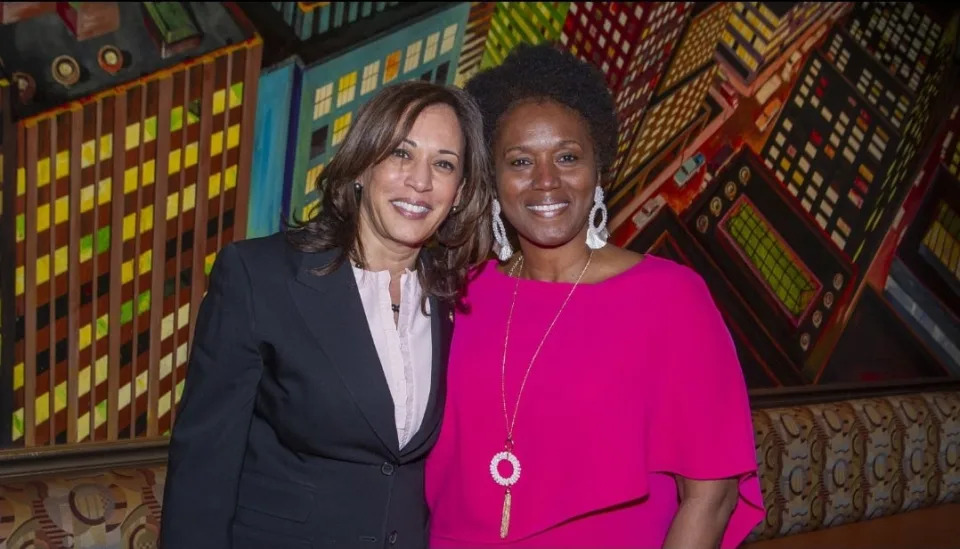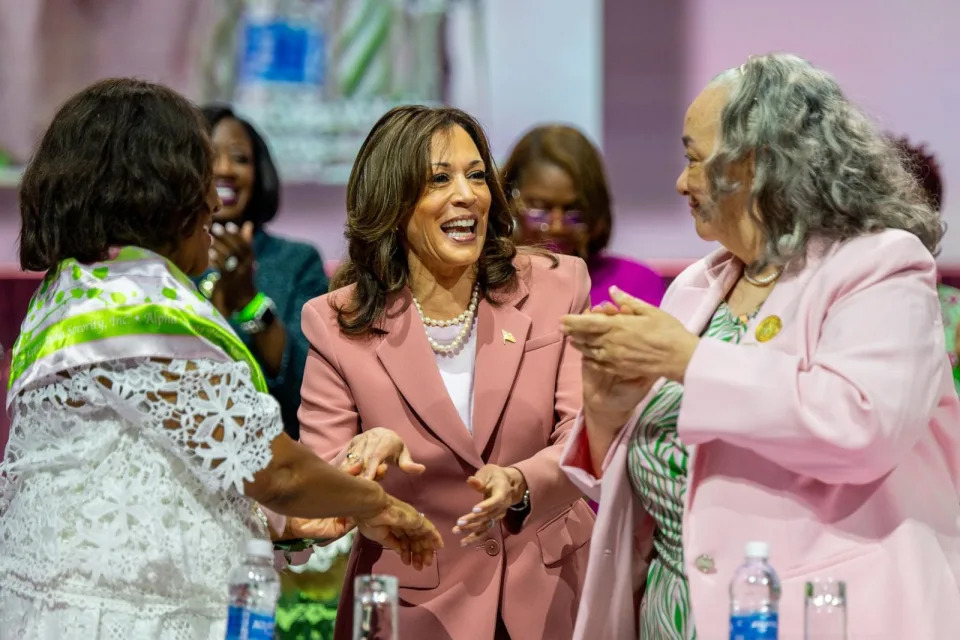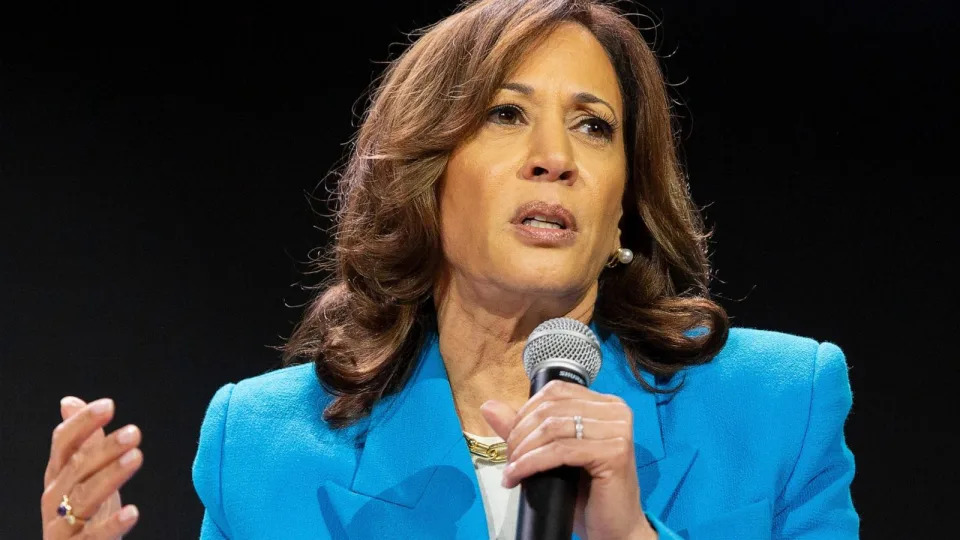Nandika Chatterjee
Fri, July 26, 2024
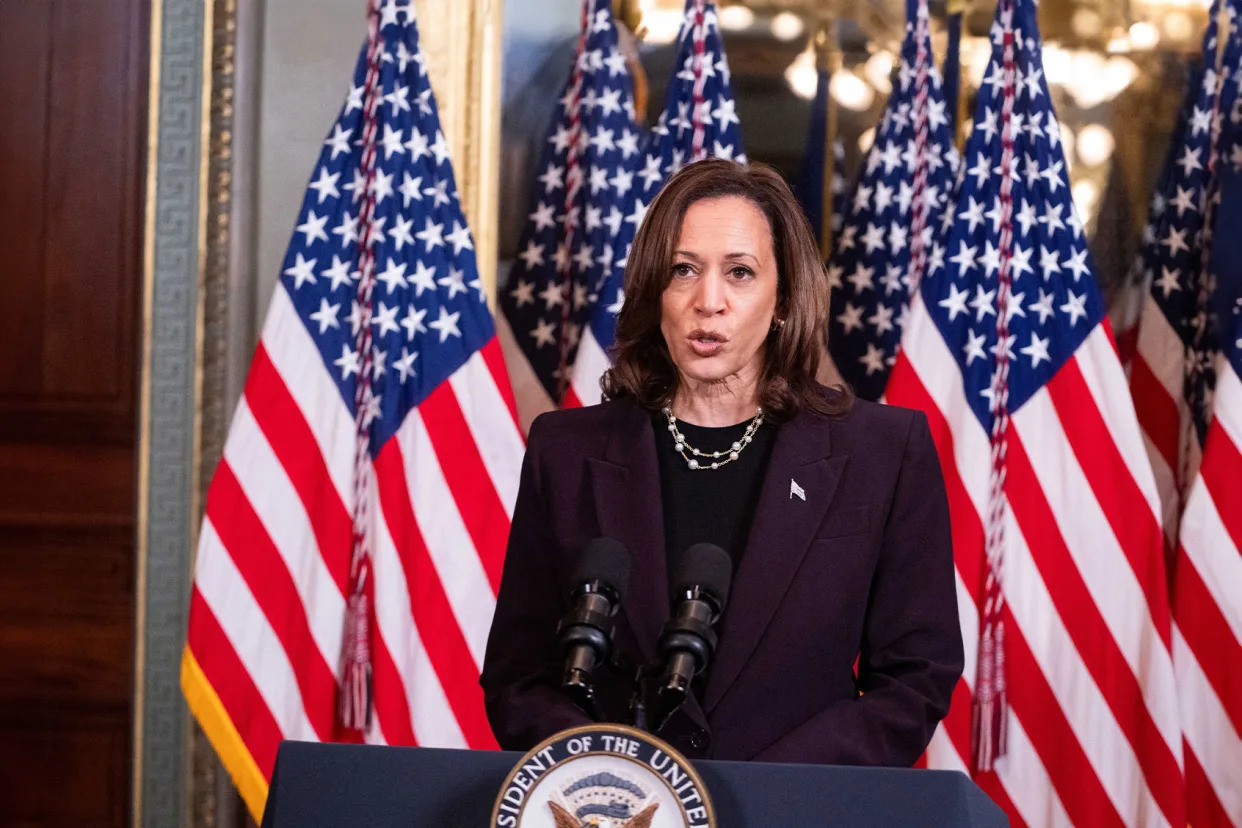
Kamala Harris ROBERTO SCHMIDT/AFP via Getty Images
An Israeli official criticized U.S. Vice President Kamala Harris for speaking out about the plight of Palestinians — the death toll is estimated at over 39,000 civilians — and calling for a quick end to the war in Gaza, claiming such remarks would only delay a ceasefire.
Harris, the presumptive Democratic nominee, expressed concerns about the war after meeting with Israeli Prime Minister Netanyahu on Thursday.
The unnamed Israeli official claimed that Harris’ comments could be misinterpreted by Hamas as evidence of a divide between the U.S. and Israel “and thus push a deal into the distance,” Reuters reported.
In her remarks following the meeting with Netanyahu, Harris said: “What has happened in Gaza over the past nine months is devastating. The images of dead children and desperate hungry people fleeing for safety, sometimes displaced for the second, third or fourth time,” the Guardian reported. “There has been hopeful movement in the talks to secure an agreement on this deal, and as I just told Prime Minister Benjamin Netanyahu, it is time to get this deal done."
Acknowledging Israel’s right to defend itself and denouncing Hamas as a dangerous terrorist organization, the vice president explained that it mattered how Israel chose to defend itself. “We cannot look away in the face of these tragedies [in Gaza],” Harris said. “We cannot allow ourselves to become numb to the suffering and I will not be silent.”
On Wednesday, Netanyahu called for more U.S. military aid for Israel, claiming that it would be the best way to restore peace to Gaza and ensure the release of hostages held by Hamas, The Guardian reported. Meanwhile, overwhelming global pressure has begun to mount as critics of the Israeli prime minister — including the families of hostages — accuse Netanyahu of prolonging the war for political purposes
Harris’ team rejects Israeli notion that her comments could harm ceasefire talks
Kylie Atwood, MJ Lee and Kayla Tausche, CNN
Sat, July 27, 2024

Vice President Kamala Harris’ office on Friday is rejecting a suggestion from a senior Israeli official that the vice president’s remarks on Thursday that forcefully criticized Israel’s conduct in its war against Hamas could have made a ceasefire deal harder to reach.
“I don’t know what they’re talking about,” a Harris aide told CNN, in response to a senior Israeli official being quoted in The Times of Israel: “Hopefully the remarks Harris made in her press conference won’t be interpreted by Hamas as daylight between the US and Israel, thereby making a deal harder to secure.”
Harris declared that she would “not be silent” about the suffering in Gaza amid the war after her meeting with Netanyahu. She also said that Israel has a right to defend itself but “how it does so matters,” staking out her lane as an empathetic and strong voice for the Palestinian suffering, just days after she became the presumptive Democratic nominee for president.
But the vice president’s office on Friday sought to clarify that her message to Netanyahu behind closed doors mirrored that of Biden.
“President Biden and Vice President Harris delivered the same message in their private meetings to Prime Minister Netanyahu: it is time to get the ceasefire and hostage deal done,” an aide to the vice president told reporters, adding that the meeting was “serious and collegial.”
Harris has already made some public comments about the ongoing Israel-Hamas war that had a similar tone to her remarks after the Netanyahu meeting on Thursday. She emphasized the need for an “immediate ceasefire” in March, taking a long pause before adding the rest of the approved sentence: “for at least the next six weeks, which is what is currently on the table.”
Harris’s office pointed out that her comments on Thursday “tracked with her previous comments on the conflict.”
“She started with rock-solid support for Israel and then she expressed her concern about civilian causalities and the humanitarian crisis in Gaza, as she always does,” said the aide, responding to reporters’ questions.
But her comments marked the first time that she spoke about the conflict since becoming the presumptive Democratic nominee as she is faced with the challenge of defining her position on the politically charged issue of the Israel-Hamas war.
Her remarks on Thursday were not a major surprise to some administration officials who have been privy to her team’s views in interagency meetings.
Multiple US officials say that Harris’ team has often advocated for putting more pressure on Israel during interagency conversations over the course of recent months since October 7. For example, Harris’s aides have been advocates for sanctions on violent Israeli settlers in the West Bank, one source said.
Harris’s aides have also opposed the idea of possible low-level engagement with far-right members of Netanyahu’s Cabinet – such as Israeli Finance Minister Bezalel Smotrich and National Security Minister Itamar Ben Gvir – making the case that engagement would be elevating their views, one official said. So far, the Biden administration has decided against reaching out to them.
Biden administration officials acknowledged that there might be some tension in the coming weeks as Harris develops her voice and her policy on the Israel-Hamas war. She has created that tension within the administration in the past on this issue. But now, they say that the tension could be worth it, given the ultimate goal of trying to draw in voters as she is at the top of the Democratic presidential ticket.
“She’s not substantively different than the president, but she’s tonally different,” one administration source told CNN.
A close friend familiar with Harris’ views expected “zero” chance she would break with Biden on policy, while acknowledging the opportunity for her to introduce more nuance, especially now that she’s the party’s candidate. “She’s allowed to support Israel but also want the war to end.”
Arab American leaders say that throughout the course of the Israel-Hamas war, Harris’ team has been “much more responsive” to the frustrations of their community when it comes to the Biden administration’s policies.
“Harris and her office threw us a lifeline early on,” Dr. James Zogby, president of the Arab American Institute. “I spoke with her and she demonstrated compassion and empathy. She wanted to know what she could do to be responsive to our concerns.”
CNN’s Tim Lister and Tamar Michaelis contributed to this report.
Kylie Atwood, MJ Lee and Kayla Tausche, CNN
Sat, July 27, 2024

Vice President Kamala Harris’ office on Friday is rejecting a suggestion from a senior Israeli official that the vice president’s remarks on Thursday that forcefully criticized Israel’s conduct in its war against Hamas could have made a ceasefire deal harder to reach.
“I don’t know what they’re talking about,” a Harris aide told CNN, in response to a senior Israeli official being quoted in The Times of Israel: “Hopefully the remarks Harris made in her press conference won’t be interpreted by Hamas as daylight between the US and Israel, thereby making a deal harder to secure.”
Harris declared that she would “not be silent” about the suffering in Gaza amid the war after her meeting with Netanyahu. She also said that Israel has a right to defend itself but “how it does so matters,” staking out her lane as an empathetic and strong voice for the Palestinian suffering, just days after she became the presumptive Democratic nominee for president.
But the vice president’s office on Friday sought to clarify that her message to Netanyahu behind closed doors mirrored that of Biden.
“President Biden and Vice President Harris delivered the same message in their private meetings to Prime Minister Netanyahu: it is time to get the ceasefire and hostage deal done,” an aide to the vice president told reporters, adding that the meeting was “serious and collegial.”
Harris has already made some public comments about the ongoing Israel-Hamas war that had a similar tone to her remarks after the Netanyahu meeting on Thursday. She emphasized the need for an “immediate ceasefire” in March, taking a long pause before adding the rest of the approved sentence: “for at least the next six weeks, which is what is currently on the table.”
Harris’s office pointed out that her comments on Thursday “tracked with her previous comments on the conflict.”
“She started with rock-solid support for Israel and then she expressed her concern about civilian causalities and the humanitarian crisis in Gaza, as she always does,” said the aide, responding to reporters’ questions.
But her comments marked the first time that she spoke about the conflict since becoming the presumptive Democratic nominee as she is faced with the challenge of defining her position on the politically charged issue of the Israel-Hamas war.
Her remarks on Thursday were not a major surprise to some administration officials who have been privy to her team’s views in interagency meetings.
Multiple US officials say that Harris’ team has often advocated for putting more pressure on Israel during interagency conversations over the course of recent months since October 7. For example, Harris’s aides have been advocates for sanctions on violent Israeli settlers in the West Bank, one source said.
Harris’s aides have also opposed the idea of possible low-level engagement with far-right members of Netanyahu’s Cabinet – such as Israeli Finance Minister Bezalel Smotrich and National Security Minister Itamar Ben Gvir – making the case that engagement would be elevating their views, one official said. So far, the Biden administration has decided against reaching out to them.
Biden administration officials acknowledged that there might be some tension in the coming weeks as Harris develops her voice and her policy on the Israel-Hamas war. She has created that tension within the administration in the past on this issue. But now, they say that the tension could be worth it, given the ultimate goal of trying to draw in voters as she is at the top of the Democratic presidential ticket.
“She’s not substantively different than the president, but she’s tonally different,” one administration source told CNN.
A close friend familiar with Harris’ views expected “zero” chance she would break with Biden on policy, while acknowledging the opportunity for her to introduce more nuance, especially now that she’s the party’s candidate. “She’s allowed to support Israel but also want the war to end.”
Arab American leaders say that throughout the course of the Israel-Hamas war, Harris’ team has been “much more responsive” to the frustrations of their community when it comes to the Biden administration’s policies.
“Harris and her office threw us a lifeline early on,” Dr. James Zogby, president of the Arab American Institute. “I spoke with her and she demonstrated compassion and empathy. She wanted to know what she could do to be responsive to our concerns.”
CNN’s Tim Lister and Tamar Michaelis contributed to this report.
Kamala Harris Hasn’t Broken From Joe Biden On Gaza. But Skeptics Of The War Watch Her Rise With Hope.
Akbar Shahid Ahmed
Sat, July 27, 2024
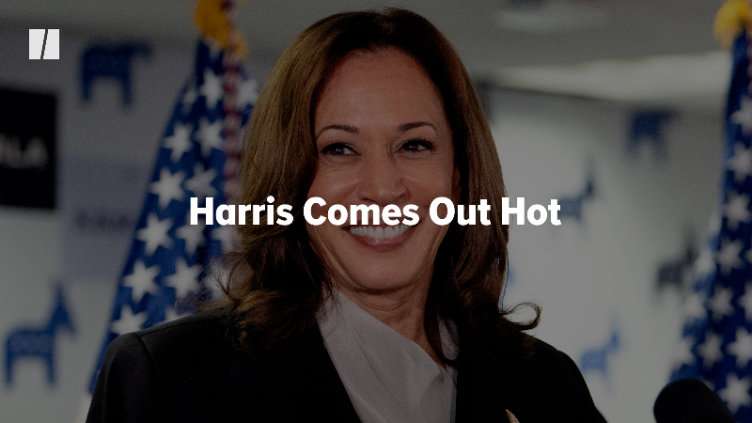
LONG READ
U.S. Vice President Kamala Harris on Thursday made her first major statement on the war in Gaza since she became the Democratic Party’s presumptive presidential nominee — affirming that she wants to see conditions improve for Palestinians, while still backing the current U.S. approach of simultaneously arming Israel and seeking a cease-fire.
Harris notably offered the U.S. administration’s official readout of discussions that she and President Joe Biden held earlier in the day with Israeli Prime Minister Benjamin Netanyahu.
“To everyone who has been calling for a cease-fire and to everyone who yearns for peace: I see you and I hear you,” she said, detailing a proposed truce that the U.S. has spent months urging Israel and the Palestinian militant group Hamas to embrace. Harris combined common administration talking points — support for Israel’s right to defend itself and concern for the human toll of its military campaign in Gaza — with the kind of detail she has often used in describing the conflict’s effects.
Citing “images of dead children and desperate hungry people fleeing for safety, sometimes displaced for the second, third or fourth time,” Harris said she told Netanyahu “to get this deal done” to help Palestinians and free Israeli hostages whom Hamas captured in the Oct. 7 attack that sparked the current fighting.
Biden rarely uses such vivid language in addressing Palestinian distress. Still, rhetoric is for now the chief difference between Harris and him when it comes to the war. As she develops her presidential campaign, managing continuity and contrast with the president on Gaza is likely to remain a top concern for Harris and her team.
Of the two voter groups she needs to woo for a victory in November — committed Democrats and a sizable number of independents — majorities have consistently opposed the U.S.-backed Israeli offensive for months. But stepping out of line with Biden could anger some in the party or spark pushback from ardent supporters of Israel. And all the while, Harris remains a high-ranking official, implicated in current policy as she faces questions about her possible future approach.
The administration took another step to position Harris as a standard-bearer on Gaza in its latest consultation on the war with outside national security experts on Friday. Such sessions are treated as ways to make sure influential voices understand and, the White House hopes, publicly defend the administration’s strategy. For the first time since such sessions began, the vice president’s team largely ran that meeting, two people familiar with the discussion told HuffPost, a shift that suggested a focus on demonstrating Harris’ foreign policy credentials.
As Harris takes a new role on the world stage, the dangers posed by the current Gaza policy have grown.
Polio is now spreading in the Palestinian enclave, the World Health Organization said Tuesday, warning an outbreak of the feared disease will be “very difficult” to stem because ongoing Israeli attacks have destroyed medical and clean water infrastructure. More than 250,000 people in the strip lack polio vaccines.
On Saturday, the risk of a new and broader war shot up. A rocket strike in northern Israel killed 11 people, sparking Israeli threats against the Hamas ally Hezbollah, which is based in Lebanon and has been striking Israeli targets throughout the war in Gaza. Israel has responded with sweeping attacks of its own, and U.S. officials have suspected the escalating tit-for-tat will spur a full-on Israeli invasion of Lebanon and devastation in both countries. (Speaking to Reuters, Hezbollah denied responsibility for the Saturday attack.)
Many humanitarian and global affairs experts say it’s past time for the U.S., as Israel’s closest ally, to use its leverage to force a change in Israeli policies in Gaza, seen as driving tensions across the Middle East. They recommend policies like Washington indicating that military and diplomatic support for Israel could end if the country does not take steps such as halting bombing altogether or letting more aid reach Palestinians.
Harris’ sudden influence already appears to be affecting the Israeli calculus. After Netanyahu’s meeting with her, Israeli officials told reporters they were surprised by her tacit criticisms, claiming these could help Hamas in cease-fire negotiations by showing “daylight” between the U.S. and Israel.
Stateside, many political observers are arguing that Harris is open to suggestions for a change from the Biden administration’s policy, including by being firmer with Netanyahu. “She’s going to be somewhat less supportive [of Israel] than President Biden has been, and I think that a large part of the Democratic Party, especially the younger members of the party, want that,” veteran Rep. Jerry Nadler (D-N.Y.) said on MSNBC this week. Patrick Gaspard, the president of the liberal Center for American Progress think tank, wrote on X that Harris’ comments after meeting with the Israeli leader led to him “hearing from many who finally felt heard by our [government].”
But most signs suggest she will remain cautious about questioning the administration’s policy or overhauling U.S.-Israel relations — a position she will need to explain and defend as the November election nears.
“She has a responsibility to define where she stands,” Mohammed Khader, the policy manager at the US Campaign for Palestinian Rights, told HuffPost, identifying “policy and institutions” as more important than “tone shifts.”
The Biden-Harris Show
Harris already has a track record on the war in Gaza. It suggests observers are right to hope she will not operate as Biden has, but should also temper their predictions.
The president’s near-total support for Israel is the result of decision-making by an insular group including him and just a handful of advisers. Foreign policy officials have told HuffPost the process has been unlike the administration’s handling of other dilemmas, such as the war in Ukraine. They say the White House has also largely disregarded pushback from government experts who believe the policy is harming U.S. interests and potentially violating U.S. and international law by funneling weapons to Israel as it faces allegations of committing war crimes. As internal complaints and public resignations of staff members have mounted, Biden’s team has said it welcomes feedback — but has not meaningfully changed course.
Harris’ aides, however, have consistently been more open to feedback, a U.S. official told HuffPost, speaking on condition of anonymity to discuss sensitive deliberations.
Her national security adviser, Phil Gordon, and her Middle East special adviser, Ilan Goldenberg, “take input from staff and don’t pretend to know all the answers to everything,” the official said.
They contrasted the pair with Biden’s controversial chief Middle East aide and his national security adviser. “Both have been much more reasonable and moderate than [Brett] McGurk [or Jake] Sullivan,” the official said. They said Gordon and Goldenberg were particularly effective in devising steps to address the Israeli government enabling violence against Palestinians in the occupied West Bank, saying: “Gaza has been all Biden people in every aspect. … Everything gets decided top-down.”
Though the two Harris aides do not hold dramatically dissimilar views from most other Biden officials, their more deliberative approach to policymaking and some of their past work suggests they may consider less deference to Israel. Gordon has urged the U.S. to reflect on its dubious track record in the Middle East, and Goldenberg has recommended that Washington boost outreach to Palestinians.
Harris herself has raised Palestinian concerns in policy discussions when she has felt they were overlooked, White House officials told The Washington Post, for a story that quoted an administration official saying the vice president chose to focus on planning among U.S. officials for Gaza’s postwar fate.
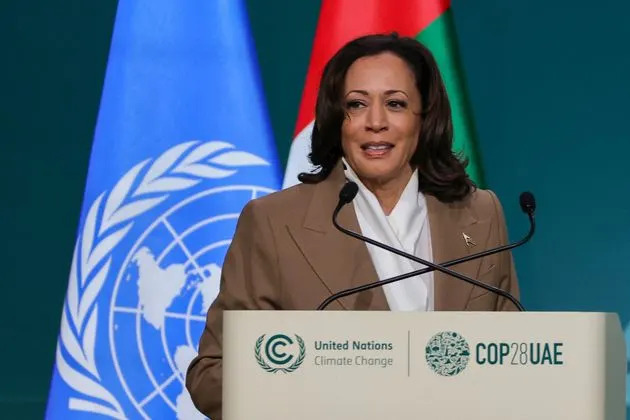
U.S. Vice President Kamala Harris appears onstage to speak during a session at a United Nations summit in Dubai, United Arab Emirates, on Dec. 2, 2023. GIUSEPPE CACACE/AFP via Getty Images
Conversations with several U.S. officials and outside analysts familiar with policymaking also suggested Harris and her staff have not been deeply involved in the administration’s day-to-day choices on the most controversial matters, like responding to Israeli airstrikes on civilian targets or wrangling Netanyahu — raising the prospect that they would have handled these situations differently.
Meanwhile, the vice president’s public comments on Gaza have drawn attention and fueled hope among some opponents of the current U.S.-Israeli policy. In December, she became the highest-ranking official to say Israel should do more to minimize Palestinian deaths. For a March speech, she personally inserted descriptions of “inhumane” conditions in Gaza, according to the Post, and said Israel had “no excuses” for restricting aid. White House staff watered down that address, according to NBC News. (Kirsten Allen, Harris’ communications director, told NBC the report was “inaccurate.”)
In that speech, Harris called for an “immediate cease-fire” in what was cast as “some of the administration’s most forceful public remarks to date” and as “some of the strongest made by a senior U.S. official” about Palestinian lives.
But she was describing the administration’s policy at the time, as it attempted to secure a temporary truce.
The episode reflects how wishful thinking and a public hunger for an administration shift have sometimes ignored a basic reality: When it comes to the fundamentals of U.S. policy, Harris has been aligned with Biden since Oct. 7.
She is a long-standing supporter of billions in military aid to Israel from the U.S., and she has not publicly challenged the president’s decisions to advance additional weaponry to the country, including by bypassing oversight from Congress, despite widespread concerns about how American bombs and other equipment will be used.
Nor has Harris weighed in on whether she believes the excessive civilian death toll she has often referenced violates international law, even amid an International Court of Justice case over “plausible” genocide in Gaza and a debate at the International Criminal Court over arrest warrants for Netanyahu and Hamas leaders. Separately, it’s unclear what she makes of lawmakers, former officials and human rights groups arguing that continued American backing for Israel breaks a U.S. law against providing weapons to a government barring the delivery of American humanitarian aid.
And Harris has not joined other Democrats who have called for halting or rethinking American weapons shipments. In the coming weeks, the administration plans to unveil an $18 billion package of additional arms for Israel, the largest since Oct. 7.

Palestinians inspect the rubble of a school destroyed in an Israeli airstrike on Deir al-Balah, central Gaza Strip, Saturday, July 27, 2024. Abdel Kareem Hana via Associated Press
Tosome, Harris’ alignment with Biden’s policy so far means it’s hard to see her as any different.
Her staff members often present “the same talking point: Kamala cares about the vulnerable, the unprotected,” said a second U.S. official who has worked with Harris’ team.
The official expressed skepticism about her concern for Palestinians affecting policy. “I don’t know if it’s really based on reality,” they said. On Gaza, the Harris team doesn’t “have strong leadership.”
Spokespeople for the vice president and the White House National Security Council did not respond to requests for comment for this story.
What Can Be
Advocates for a different U.S. strategy for the war in Gaza and the broader Israeli-Palestinian conflict openly hope they can push Harris in a new direction. Some point to personal reasons why she may be more attuned to Palestinians’ experience.
The vice president is close to her pastor, Amos Brown, whom she consulted last weekend as Biden passed the baton to her in the 2024 election. Per The Washington Post, Brown directly asked Harris in February to help Palestinians, arguing their struggle resonates with that of Black Americans. Black churches have broadly been important centers of support for Democratic candidates, and amid the war, more than 1,000 Black pastors have called for a cease-fire. The move showed “a recognition within the Black church that their role [in conversations about the war] is as important as any other voter bloc,” said Khader from the US Campaign for Palestinian Rights, who is Black and Palestinian.
And Harris, unlike Biden, “does not have a long-term personal relationship with Netanyahu,” noted Sarah Harrison, an analyst at the Crisis Group think tank. That history is widely understood to have contributed to the president’s reluctance to break more fully with his Israeli counterpart.
“She is listening to the next generation in a way that President Biden did not,” Harrison said, pointing to “young, progressive women” close to Harris who have expressed solidarity with Palestinians, notably niece Meena Harris and stepdaughter Ella Emhoff.
Harrison, who has criticized the Biden administration’s Gaza approach, is realistic about where Harris stands: “She is still going to work within the parameters the Democratic Party has set on foreign policy. She’s not one who tends to rock the boat.”
But a Harris presidency could put extra pressure on achieving goals like establishing a Palestinian state living alongside Israel and holding violators of international law accountable, Harrison said.
“She could set a different tone” for government officials, argued Harrison, who previously worked on laws covering weapons transfers at the Pentagon. That might encourage them to, for instance, apply the same human rights standards to Israel that the U.S. does to other countries receiving American arms.
Matt Duss of the Center for International Policy think tank recently argued Harris could even as a candidate embrace moves like restoring U.S. funding for UNRWA, the United Nations agency serving Palestinians. (Biden suspended the funding after Israeli allegations that workers with the agency were involved in the Oct. 7 attack, for which an independent review said Israel has yet to provide sufficient proof. The U.S. is now the only country to have rescinded funding that has not since reversed the move; lawmakers from both major parties this spring voted to write a one-year ban into American law.)
Closer to home, Harris has the chance to unburden herself from Biden’s Middle East agenda in ways that reap political benefits.
For instance, the president putting a U.S.-Israel-Saudi Arabia deal as his top goal in the region may have made his team wary of criticizing the Saudis. But that meant a major line of attack against Republican presidential candidate Donald Trump was left on the table. Biden “should be bashing Trump over his business ties with Saudi Arabia,” said Stephen Miles, the president of the progressive advocacy group Win Without War. “They should be talking about corruption. But that’s not what they’re doing.”

Abbas Alawieh speaks during an election night gathering, Feb. 27, 2024, in Dearborn, Michigan. via Associated Press
As she tries to rally support, Gaza will be key for the vice president’s approach to some deeply disillusioned groups of Democratic voters, from students to Arab Americans. For some, simply having a set of new faces to deal with may inspire some hope.
“President Biden’s team has failed to substantively engage with the policy demands of our Uncommitted movement,” said Abbas Alawieh, an organizer with the “uncommitted” movement, in which tens of thousands of Democrats denied Biden their primary votes in opposition to his Gaza policy. Biden has repeatedly directed aides to reach out to Alawieh and others in his coalition but has not altered U.S. policy on Gaza in response.
“We’re hoping that Vice President Harris takes a different approach, listening to voters’ concerns and engaging seriously with our demand for an arms embargo that saves lives and helps achieve a cease-fire and a release of all hostages and detainees,” Alawieh added.
With fighting, deaths and U.S. involvement in the war ongoing, those seeking change are tracking Harris’ moves now, not just her promises for when she may be in the Oval Office — and the final say on shifts that could boost her candidacy remains with the president.
“We are clear on how dangerous Trump is, and that’s part of why we need Biden and Harris to change course immediately,” Alawieh said.
Arguing that “it’s never fair to judge a vice president based on the president they serve,” Miles told HuffPost that “the work to end the suffering in Gaza cannot wait for another half a year.”
“The person who can do the most, right now, to secure a cease-fire, release the hostages, and set the stage for a sustainable peace is and remains President Joe Biden,” he continued.
Harris notably offered the U.S. administration’s official readout of discussions that she and President Joe Biden held earlier in the day with Israeli Prime Minister Benjamin Netanyahu.
“To everyone who has been calling for a cease-fire and to everyone who yearns for peace: I see you and I hear you,” she said, detailing a proposed truce that the U.S. has spent months urging Israel and the Palestinian militant group Hamas to embrace. Harris combined common administration talking points — support for Israel’s right to defend itself and concern for the human toll of its military campaign in Gaza — with the kind of detail she has often used in describing the conflict’s effects.
Citing “images of dead children and desperate hungry people fleeing for safety, sometimes displaced for the second, third or fourth time,” Harris said she told Netanyahu “to get this deal done” to help Palestinians and free Israeli hostages whom Hamas captured in the Oct. 7 attack that sparked the current fighting.
Biden rarely uses such vivid language in addressing Palestinian distress. Still, rhetoric is for now the chief difference between Harris and him when it comes to the war. As she develops her presidential campaign, managing continuity and contrast with the president on Gaza is likely to remain a top concern for Harris and her team.
Of the two voter groups she needs to woo for a victory in November — committed Democrats and a sizable number of independents — majorities have consistently opposed the U.S.-backed Israeli offensive for months. But stepping out of line with Biden could anger some in the party or spark pushback from ardent supporters of Israel. And all the while, Harris remains a high-ranking official, implicated in current policy as she faces questions about her possible future approach.
The administration took another step to position Harris as a standard-bearer on Gaza in its latest consultation on the war with outside national security experts on Friday. Such sessions are treated as ways to make sure influential voices understand and, the White House hopes, publicly defend the administration’s strategy. For the first time since such sessions began, the vice president’s team largely ran that meeting, two people familiar with the discussion told HuffPost, a shift that suggested a focus on demonstrating Harris’ foreign policy credentials.
As Harris takes a new role on the world stage, the dangers posed by the current Gaza policy have grown.
Polio is now spreading in the Palestinian enclave, the World Health Organization said Tuesday, warning an outbreak of the feared disease will be “very difficult” to stem because ongoing Israeli attacks have destroyed medical and clean water infrastructure. More than 250,000 people in the strip lack polio vaccines.
On Saturday, the risk of a new and broader war shot up. A rocket strike in northern Israel killed 11 people, sparking Israeli threats against the Hamas ally Hezbollah, which is based in Lebanon and has been striking Israeli targets throughout the war in Gaza. Israel has responded with sweeping attacks of its own, and U.S. officials have suspected the escalating tit-for-tat will spur a full-on Israeli invasion of Lebanon and devastation in both countries. (Speaking to Reuters, Hezbollah denied responsibility for the Saturday attack.)
Many humanitarian and global affairs experts say it’s past time for the U.S., as Israel’s closest ally, to use its leverage to force a change in Israeli policies in Gaza, seen as driving tensions across the Middle East. They recommend policies like Washington indicating that military and diplomatic support for Israel could end if the country does not take steps such as halting bombing altogether or letting more aid reach Palestinians.
Harris’ sudden influence already appears to be affecting the Israeli calculus. After Netanyahu’s meeting with her, Israeli officials told reporters they were surprised by her tacit criticisms, claiming these could help Hamas in cease-fire negotiations by showing “daylight” between the U.S. and Israel.
Stateside, many political observers are arguing that Harris is open to suggestions for a change from the Biden administration’s policy, including by being firmer with Netanyahu. “She’s going to be somewhat less supportive [of Israel] than President Biden has been, and I think that a large part of the Democratic Party, especially the younger members of the party, want that,” veteran Rep. Jerry Nadler (D-N.Y.) said on MSNBC this week. Patrick Gaspard, the president of the liberal Center for American Progress think tank, wrote on X that Harris’ comments after meeting with the Israeli leader led to him “hearing from many who finally felt heard by our [government].”
But most signs suggest she will remain cautious about questioning the administration’s policy or overhauling U.S.-Israel relations — a position she will need to explain and defend as the November election nears.
“She has a responsibility to define where she stands,” Mohammed Khader, the policy manager at the US Campaign for Palestinian Rights, told HuffPost, identifying “policy and institutions” as more important than “tone shifts.”
The Biden-Harris Show
Harris already has a track record on the war in Gaza. It suggests observers are right to hope she will not operate as Biden has, but should also temper their predictions.
The president’s near-total support for Israel is the result of decision-making by an insular group including him and just a handful of advisers. Foreign policy officials have told HuffPost the process has been unlike the administration’s handling of other dilemmas, such as the war in Ukraine. They say the White House has also largely disregarded pushback from government experts who believe the policy is harming U.S. interests and potentially violating U.S. and international law by funneling weapons to Israel as it faces allegations of committing war crimes. As internal complaints and public resignations of staff members have mounted, Biden’s team has said it welcomes feedback — but has not meaningfully changed course.
Harris’ aides, however, have consistently been more open to feedback, a U.S. official told HuffPost, speaking on condition of anonymity to discuss sensitive deliberations.
Her national security adviser, Phil Gordon, and her Middle East special adviser, Ilan Goldenberg, “take input from staff and don’t pretend to know all the answers to everything,” the official said.
They contrasted the pair with Biden’s controversial chief Middle East aide and his national security adviser. “Both have been much more reasonable and moderate than [Brett] McGurk [or Jake] Sullivan,” the official said. They said Gordon and Goldenberg were particularly effective in devising steps to address the Israeli government enabling violence against Palestinians in the occupied West Bank, saying: “Gaza has been all Biden people in every aspect. … Everything gets decided top-down.”
Though the two Harris aides do not hold dramatically dissimilar views from most other Biden officials, their more deliberative approach to policymaking and some of their past work suggests they may consider less deference to Israel. Gordon has urged the U.S. to reflect on its dubious track record in the Middle East, and Goldenberg has recommended that Washington boost outreach to Palestinians.
Harris herself has raised Palestinian concerns in policy discussions when she has felt they were overlooked, White House officials told The Washington Post, for a story that quoted an administration official saying the vice president chose to focus on planning among U.S. officials for Gaza’s postwar fate.

U.S. Vice President Kamala Harris appears onstage to speak during a session at a United Nations summit in Dubai, United Arab Emirates, on Dec. 2, 2023. GIUSEPPE CACACE/AFP via Getty Images
Conversations with several U.S. officials and outside analysts familiar with policymaking also suggested Harris and her staff have not been deeply involved in the administration’s day-to-day choices on the most controversial matters, like responding to Israeli airstrikes on civilian targets or wrangling Netanyahu — raising the prospect that they would have handled these situations differently.
Meanwhile, the vice president’s public comments on Gaza have drawn attention and fueled hope among some opponents of the current U.S.-Israeli policy. In December, she became the highest-ranking official to say Israel should do more to minimize Palestinian deaths. For a March speech, she personally inserted descriptions of “inhumane” conditions in Gaza, according to the Post, and said Israel had “no excuses” for restricting aid. White House staff watered down that address, according to NBC News. (Kirsten Allen, Harris’ communications director, told NBC the report was “inaccurate.”)
In that speech, Harris called for an “immediate cease-fire” in what was cast as “some of the administration’s most forceful public remarks to date” and as “some of the strongest made by a senior U.S. official” about Palestinian lives.
But she was describing the administration’s policy at the time, as it attempted to secure a temporary truce.
The episode reflects how wishful thinking and a public hunger for an administration shift have sometimes ignored a basic reality: When it comes to the fundamentals of U.S. policy, Harris has been aligned with Biden since Oct. 7.
She is a long-standing supporter of billions in military aid to Israel from the U.S., and she has not publicly challenged the president’s decisions to advance additional weaponry to the country, including by bypassing oversight from Congress, despite widespread concerns about how American bombs and other equipment will be used.
Nor has Harris weighed in on whether she believes the excessive civilian death toll she has often referenced violates international law, even amid an International Court of Justice case over “plausible” genocide in Gaza and a debate at the International Criminal Court over arrest warrants for Netanyahu and Hamas leaders. Separately, it’s unclear what she makes of lawmakers, former officials and human rights groups arguing that continued American backing for Israel breaks a U.S. law against providing weapons to a government barring the delivery of American humanitarian aid.
And Harris has not joined other Democrats who have called for halting or rethinking American weapons shipments. In the coming weeks, the administration plans to unveil an $18 billion package of additional arms for Israel, the largest since Oct. 7.

Palestinians inspect the rubble of a school destroyed in an Israeli airstrike on Deir al-Balah, central Gaza Strip, Saturday, July 27, 2024. Abdel Kareem Hana via Associated Press
Tosome, Harris’ alignment with Biden’s policy so far means it’s hard to see her as any different.
Her staff members often present “the same talking point: Kamala cares about the vulnerable, the unprotected,” said a second U.S. official who has worked with Harris’ team.
The official expressed skepticism about her concern for Palestinians affecting policy. “I don’t know if it’s really based on reality,” they said. On Gaza, the Harris team doesn’t “have strong leadership.”
Spokespeople for the vice president and the White House National Security Council did not respond to requests for comment for this story.
What Can Be
Advocates for a different U.S. strategy for the war in Gaza and the broader Israeli-Palestinian conflict openly hope they can push Harris in a new direction. Some point to personal reasons why she may be more attuned to Palestinians’ experience.
The vice president is close to her pastor, Amos Brown, whom she consulted last weekend as Biden passed the baton to her in the 2024 election. Per The Washington Post, Brown directly asked Harris in February to help Palestinians, arguing their struggle resonates with that of Black Americans. Black churches have broadly been important centers of support for Democratic candidates, and amid the war, more than 1,000 Black pastors have called for a cease-fire. The move showed “a recognition within the Black church that their role [in conversations about the war] is as important as any other voter bloc,” said Khader from the US Campaign for Palestinian Rights, who is Black and Palestinian.
And Harris, unlike Biden, “does not have a long-term personal relationship with Netanyahu,” noted Sarah Harrison, an analyst at the Crisis Group think tank. That history is widely understood to have contributed to the president’s reluctance to break more fully with his Israeli counterpart.
“She is listening to the next generation in a way that President Biden did not,” Harrison said, pointing to “young, progressive women” close to Harris who have expressed solidarity with Palestinians, notably niece Meena Harris and stepdaughter Ella Emhoff.
Harrison, who has criticized the Biden administration’s Gaza approach, is realistic about where Harris stands: “She is still going to work within the parameters the Democratic Party has set on foreign policy. She’s not one who tends to rock the boat.”
But a Harris presidency could put extra pressure on achieving goals like establishing a Palestinian state living alongside Israel and holding violators of international law accountable, Harrison said.
“She could set a different tone” for government officials, argued Harrison, who previously worked on laws covering weapons transfers at the Pentagon. That might encourage them to, for instance, apply the same human rights standards to Israel that the U.S. does to other countries receiving American arms.
Matt Duss of the Center for International Policy think tank recently argued Harris could even as a candidate embrace moves like restoring U.S. funding for UNRWA, the United Nations agency serving Palestinians. (Biden suspended the funding after Israeli allegations that workers with the agency were involved in the Oct. 7 attack, for which an independent review said Israel has yet to provide sufficient proof. The U.S. is now the only country to have rescinded funding that has not since reversed the move; lawmakers from both major parties this spring voted to write a one-year ban into American law.)
Closer to home, Harris has the chance to unburden herself from Biden’s Middle East agenda in ways that reap political benefits.
For instance, the president putting a U.S.-Israel-Saudi Arabia deal as his top goal in the region may have made his team wary of criticizing the Saudis. But that meant a major line of attack against Republican presidential candidate Donald Trump was left on the table. Biden “should be bashing Trump over his business ties with Saudi Arabia,” said Stephen Miles, the president of the progressive advocacy group Win Without War. “They should be talking about corruption. But that’s not what they’re doing.”

Abbas Alawieh speaks during an election night gathering, Feb. 27, 2024, in Dearborn, Michigan. via Associated Press
As she tries to rally support, Gaza will be key for the vice president’s approach to some deeply disillusioned groups of Democratic voters, from students to Arab Americans. For some, simply having a set of new faces to deal with may inspire some hope.
“President Biden’s team has failed to substantively engage with the policy demands of our Uncommitted movement,” said Abbas Alawieh, an organizer with the “uncommitted” movement, in which tens of thousands of Democrats denied Biden their primary votes in opposition to his Gaza policy. Biden has repeatedly directed aides to reach out to Alawieh and others in his coalition but has not altered U.S. policy on Gaza in response.
“We’re hoping that Vice President Harris takes a different approach, listening to voters’ concerns and engaging seriously with our demand for an arms embargo that saves lives and helps achieve a cease-fire and a release of all hostages and detainees,” Alawieh added.
With fighting, deaths and U.S. involvement in the war ongoing, those seeking change are tracking Harris’ moves now, not just her promises for when she may be in the Oval Office — and the final say on shifts that could boost her candidacy remains with the president.
“We are clear on how dangerous Trump is, and that’s part of why we need Biden and Harris to change course immediately,” Alawieh said.
Arguing that “it’s never fair to judge a vice president based on the president they serve,” Miles told HuffPost that “the work to end the suffering in Gaza cannot wait for another half a year.”
“The person who can do the most, right now, to secure a cease-fire, release the hostages, and set the stage for a sustainable peace is and remains President Joe Biden,” he continued.





